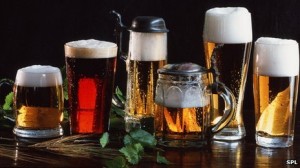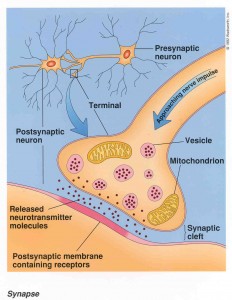
Accompanying the inevitable hangover, this is an all too common question following an evening, or morning, I’m not here to judge, of alcohol-infused merriment. At face value this question could be in response to any number of mysteries: where is my wallet? Why does my face hurt? Who is that and why are they wearing my dressing gown? However, from a scientific point of view, I think this is an extremely interesting question.
So why does drinking alcohol boost confidence and give you that warm fuzzy feeling? Why are your inhibitions lowered? Why does your bladder suddenly seem to shrink to the size of a walnut? and why, the next day, does it feel like someone ran a bulldozer through your brain?
First of all, what is alcohol. The alcohols are actually a family of molecules, who share the common molecular formula of CnH2n+1OH. The one we are interested in is ethanol (C2H5OH).

When consumed, ethanol enters the stomach and small intestine and is absorbed into the bloodstream. The more food in the digestive system, blocking the path of the alcohol, the slower the alcohol enters the bloodstream. This is why drinking on an empty stomach is ill-advised, and university flatmates living by the rule that ‘eating is cheating’ should not be listened to!
The most obvious, and most desirable effects of alcohol are due to how it affects the brain. The brain is clearly an extremely complex organ, although maybe more complex in some people than others. It is composed of many different sections, which need to communicate with each other, and the rest of the body, with exact precision. Signals are transmitted via nerve cells (neurons), using chemicals called neurotransmitters (NTs). To send a signal from one nerve cell to another, a NT is released and binds to its specific receptor on the receiving cell, delivering the message, much like a postman delivering a letter from one person to another.

http://www.unc.edu/~ejw/synapse.html
NTs are separated into 2 groups, excitatory, which increase brain activity, and inhibitory, which do the opposite. 4 NTs are affected by alcohol: gamma aminobutyric acid (GABA), glutamate, serotonin and dopamine.
GABA is an inhibitory NT, whose activity is increased by ethanol. GABA is responsible for slowing brain activity, inducing a feeling of calm and lowered inhibitions. This is therefore to blame for all the regrettable decisions that so often occur after a drink… or three. Increased GABA activity is also the reason for the tired feeling that comes after a few drinks. To combat this the body craves fuel, in the form of food. This is why a greasy chicken shop suddenly looks like a Michelin starred house of fine dining.
Glutamate is an excitatory NT, involved in the process of long-term potentiation, which is responsible for memory. The effects of ethanol are to block one family of glutamate receptors (called N- methy-D-aspartate, NMDA receptors), preventing glutamate from delivering its message. Therefore, glutamate signalling, and memory, cannot function to their full capacity. This is the explanation for the, often fortunate, memory loss that can accompany inebriation.
Dopamine and serotonin are both associated with the brain’s reward centre. Ethanol increases the levels of these NTs, giving a feeling of pleasure. Chocolate and sex have similar effects, and this increase in happiness one of the reasons for the addictive nature of alcohol.
So after a few drinks, you’re feeling calmer, more confident and generally happier. However, the inevitable then happens and you must empty your bladder. This is not only because of the increased amounts of fluids that have been consumed, but there is another reason for this increase in urine production. Ethanol inhibits the production of a hormone (chemical messenger) called vasopressin. Vasopressin normally goes to the kidneys and tells them to reabsorb water back into the bloodstream instead of sending it to the bladder and down the toilet. Therefore, with less vasopressin, less water is taken back into the blood and more is sent to the bladder. In fact, drinking half a pint of an alcoholic drink causes the body to produce 2 pints of urine!
With this increased urination comes another problem, which is not obvious at the time, but will become extremely obvious the next morning. The hangover. The loss of water causes the body to distribute what remains around the body, which involves taking water away from organs that have it and giving it to those that don’t. Unfortunately, the brain has a large supply of water, which it subsequently loses. This causes the brain to shrink and pull on its connection to the skull, causing pain. Water is not the only thing that the body loses during urination. Alcohol breaks down glycogen (energy stores) in the liver, forming glucose. This glucose is then expelled from the body. Salts and electrolytes, such as sodium and potassium, are important for general cellular function, many of which are lost during excessive urination. This loss of water, energy, salts and electrolytes lead to dehydration, headache, muscular aches and nausea, or in other words a hangover.
Alcohol is broken down by the liver, in a three-step process. An intermediate product of alcohol breakdown is acetaldehyde, which is effectively a poison. As this builds up, it leads to the same unwanted effects of headache and nausea.
So in summary, drinking alcohol has many positive outcomes, due to its effects of the brain and the way it influences the signalling between neurons. However, it causes the body to urinate more, and literally piss away many important chemicals. The result is dehydration, fatigue, headache and usually an accompanying short temper. Hopefully this is an interesting topic that you can tell all of your friends about on your next trip to the pub. Cheers!
For a summary of this in song format, check out this fantastic video: